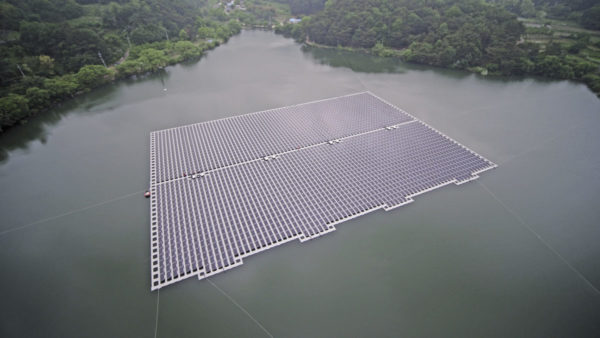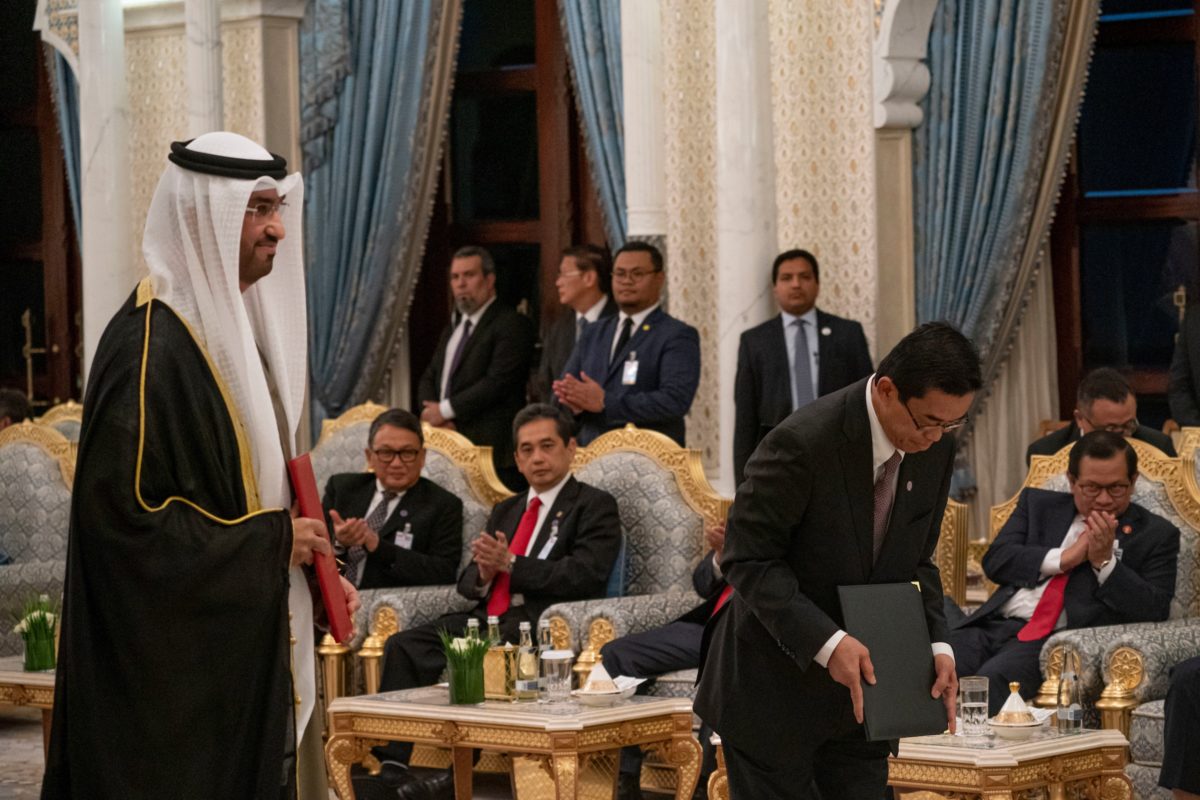Oil floats on water because it’s less dense. Abu Dhabi oil money floats on water because it’s investing in floating solar PV to diversify its obsolescent fossil-fuel economy.
Masdar, part of the Abu Dhabi state-owned Mubadala investment fund, has entered a partnership with Indonesian state electricity company Perusahaan Listrik Negara (PLN) via a power purchase agreement (PPA). The deal will see the country gain its first floating solar PV plant, the largest of its kind in South East Asia.
The agreement was finalised with a formal exchange of documents at the Presidential palace in Abu Dhabi on Sunday. The ceremony, attended by Abu Dhabi’s Crown Prince Sheikh Mohamed bin Zayed Al Nahyan and Indonesian President Joko Widodo, represents a coup for both parties as Abu Dhabi looks to diversify its energy portfolio and Indonesia seeks to find solutions to the kind of energy integration issues faced by every archipelagic state.
The project, a 145 MW floating PV plant, is to be built on a 225-hectare plot of the Cirata Reservoir in West Java. As the world’s largest archipelago Indonesia is made up of more than 17,000 islands, 521 natural lakes, and over 100 reservoirs. Indonesia is planning floating PV installments at an additional 60 locations as it looks to achieve its target of 23% renewables by 2025, and 31% by 2030.

Image: Hanwha Q Cells
Indonesia is the biggest consumer of energy in the Association of Southeast Asian Nations (ASEAN), so it is no wonder the country is eager to scale up renewables in its energy mix. The International Renewable Energy Agency (IRENA) estimates Indonesia could save as much as US$51.7 billion per year considering the effects of air pollution and climate change.
“The Cirata floating PV project is a monumental renewable energy project for Indonesia, and the biggest floating PV in South East Asia. It will improve the capability of the Jawa-Bali power system and also increase the renewable energy mix in Indonesia,” said Zulkifli Zaini, President Director of PLN. “The potential of similar projects is endless and we anticipate construction should begin soon, aiming for commercial operation in 2022.”
Masdar sees itself as the avant-garde of the energy portfolio transition to renewables amongst the oil-rich gulf states. “The UAE has demonstrated a longstanding commitment to promoting and investing in clean energy projects around the world,” said Sultan bin Ahmad Al Jaber, UAE Minister of State and Chairman of Masdar. The Our World in Data statistics website based at Oxford University listed the UAE as the fourth worst polluting nation in the world in 2017, in terms of its per capita carbon footprint, with a figure of 24.66 tons, compared to Qatar’s 49.18; Trinidad & Tobago, with 29.72; and Kuwait, with 25.24.
Masdar does, it must be said, possess a large renewable energy portfolio (although one wouldn’t want to relativise renewables figures against the UAE’s oil exports). In the last few months alone, Masdar won an auction to build 200 MW of solar in Azerbaijan, 400 MW of solar in Armenia, and 100 MW in Uzbekistan. Masdar’s renewable energy portfolio currently has a generating capacity exceeding 5 GW, the result of a combined investment of approximately US$13.5 billion.
“This agreement between Masdar and PLN marks a significant milestone in Indonesia’s sustainable energy journey,” continued Al Jaber. “Leveraging innovative solutions such as this floating solar PV project will be critical to the nation achieving its renewable energy targets and to supporting its sustainable growth.”
As mentioned above, archipelagic states, of which the ASEAN region is replete, are looking to floating solar PV plants as if it were a tailored solution, and indeed in some ways, it is. Most obviously, like Indonesia, many Southeast Asian nations have large aqueous areas but shrinking land resources as their populations grow, requiring more space for housing, agriculture, and industry.
Moreover, floating panels can also be more efficient in tropical and equatorial regions (Indonesia is on the equator) due to water’s cooling effect, not to mention their shade’s ability to reduce evaporation and conserve fresh drinking water from evaporation. Masdar, in the words of Al Jaber, sees “tremendous potential” for the “development of renewable energy solutions in the Southeast Asia market” due to the “regions rapid economic growth.”
The deal marks a positive start to this week’s Abu Dhabi Sustainability Week, in which energy and climate change are said to be key points of discussion.
This content is protected by copyright and may not be reused. If you want to cooperate with us and would like to reuse some of our content, please contact: editors@pv-magazine.com.









1 comment
By submitting this form you agree to pv magazine using your data for the purposes of publishing your comment.
Your personal data will only be disclosed or otherwise transmitted to third parties for the purposes of spam filtering or if this is necessary for technical maintenance of the website. Any other transfer to third parties will not take place unless this is justified on the basis of applicable data protection regulations or if pv magazine is legally obliged to do so.
You may revoke this consent at any time with effect for the future, in which case your personal data will be deleted immediately. Otherwise, your data will be deleted if pv magazine has processed your request or the purpose of data storage is fulfilled.
Further information on data privacy can be found in our Data Protection Policy.